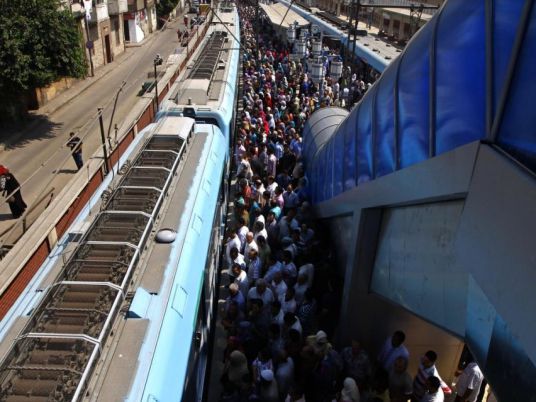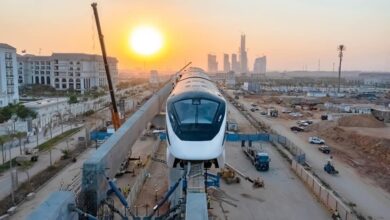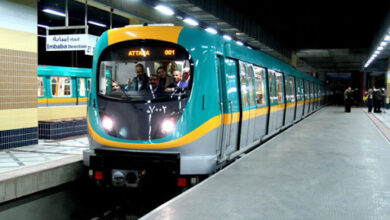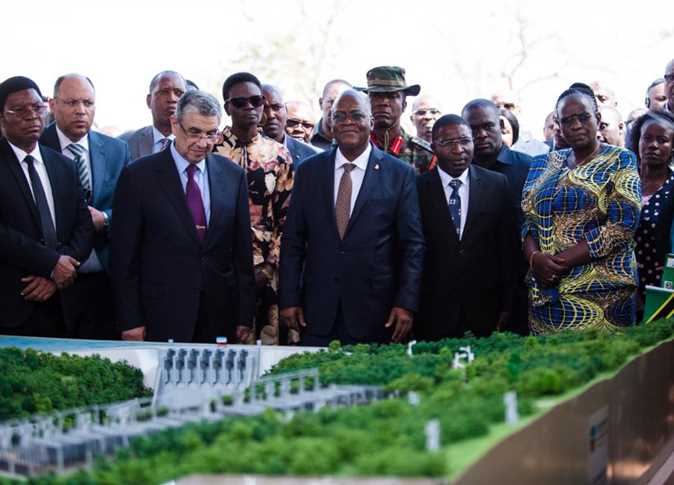
The National Authority for Tunnels and the Public Administration of Giza Traffic closed the area extending from Ismail Mohamed Street to Brazil Street in Zamalek on Sunday, for a week to gauge the impact of the closure on traffic.
The French-Egyptian consortium, constructing the metro third line, began site inspection in preparation for the transfer of equipment, to start work in few days.
The companies, as well as the National Authority for Tunnels, have to experiment with construction measures before beginning the project, to discern the impact of drilling on the surrounding area, according to Spokesman of the National Tunnels Authority Hassan Tawfik.
A lawsuit was filed against Chairman of the Board of Directors of the National Authority for Tunnels, aiming to halt the implementation of the third construction phase for the third line of the Cairo Underground Metro, under Ismail Mohamed Street in Zamalek Island.
Some of the more zealous residents of Zamalek, who object to the subway tunneling through their neighborhood, have trickled into the courthouse gradually. They claim Zamalek the island soil is weak and it is not suitable for metro traffic.
The details of the case were given by one of the involved, residents who is adamantly against the project, “The street they chose for the station is a very small and is a one way, we are afraid that houses or lives may get harmed.”
The judicial dispute began with Ibrahim Seoudi, the lawyer for the 40 plaintiffs, submitting special engineering studies to the court that suggest that the implementation of the third phase of the third line of the subway would place Zamalek area in serious danger, threatening the architectural and cultural heritage of the area.
Nevertheless, a substitute route has been suggested by the Japan International Cooperation Agency (JICA), passing through the Kit Kat area then over the Nile via a bridge. Seoudi said this suggestion was mentioned in one of the books of the former Transport Minister Ibrahim al-Demiri.
“This route is less expensive and more secure, costing no more than 3 percent of the cost of underground drilling,” said Seoudi, adding: “The subject lacks transparency, and we didn’t feel that there were any serious soil studies in Zamalek.”
Seoudi questioned the increased interest value of the loans for the preliminary phases of the metro, according to some documents of the case. The documents include the financial protocol signed between the government and the French body funding the project, stating “The interest rate in the first phase was 0.02 percent and in the third phase it became 1.97 percent.”
In a telephone interview with Al-Masry Al-Youm, Tawfik explained that the claim that the soil is unsuitable for drilling works in Zamalek has been shown to be incorrect, both geometrically and scientifically. This fact is reflected in the Opera metro station of the second line of the subway, which is located in Gezira island, near Zamalek neighborhood: “The Opera metro station opened in 1996, and we know the soil better now. [In fact,] what is supposed to happen after 21 years, is that the technology has evolved,” Tawfik said.
In the April 18 session, the court set July 1 to issue a verdict in the case No. 55989, considered by Seoudi as a positive step.
Meanwhile, in the struggle against the Zamalek metro, there have been calls for the president to intervene. Residents express themselves fervently in the Facebook group “Save Zamalek Island,” home to about 2,000 residents of the prestigious district.
“The security of Zamalek,” is one of the main concerns shared among the members of this community, as well as pushing the third line of the subway to an alternative route which does not pass through the island. The civil struggle of the residents has caused them to resort to a judicial approach. For their legal battle, they filed a case with the State Council three years ago against the National Authority for Tunnels, which is affiliated with Transport Ministry, as well as organized attempts to advocate and gain public support for the fairness of their demands.
In an elegant paper case, Maha al-Tarabeshi, a media professor, resident of Zamalek and a strong activist in the Zamalek metro case, keeps a semi-complete archive of Zamalek residents’ campaign against the Zamalek subway station, tracing a clear map of the campaign’s history from its inception.
Tarabeshi and her family have lived in the Zamalek neighborhood since she was a child, a quiet area embracing several foreign communities because of the scattered diplomatic bodies in it. “90% of the embassies in Egypt are in the Zamalek district. Here is where ambassadors and members of diplomatic bodies reside,” she said.
Since hearing the news about the new metro station in her neighborhood, the issue of securing the diplomatic buildings in the vicinity, as well as her own personal security and that of her family, became a matter of concern: “Anyone can come to Zamalek through the Metro and commit a terrorist act,” Tarabeshi exclaimed.
In one of the halls of Abdel Moneim El Sawy Culture Wheel in Zamalek, there was a public meeting in 2012 between the residents and the head of the National Authority for Tunnels, Major General Ismail al-Najdi. However, the public meeting did not end well, with Najdi withdrawing in the middle of the meeting during an argument with the audience.
After nearly three years of litigation, and arguments with the representatives of the state, the campaigners are frustrated and hopeless. “We hang no great hope on the judicial judgment, but we have to try. We have published more than one appeal to the presidency on the pages of newspapers. After the first appeal, there was a good response, then, later we just didn’t hear anything and we don’t know what happened,” Tarabeshi explained.
Edited Translation From Al-Masry Al-Youm



